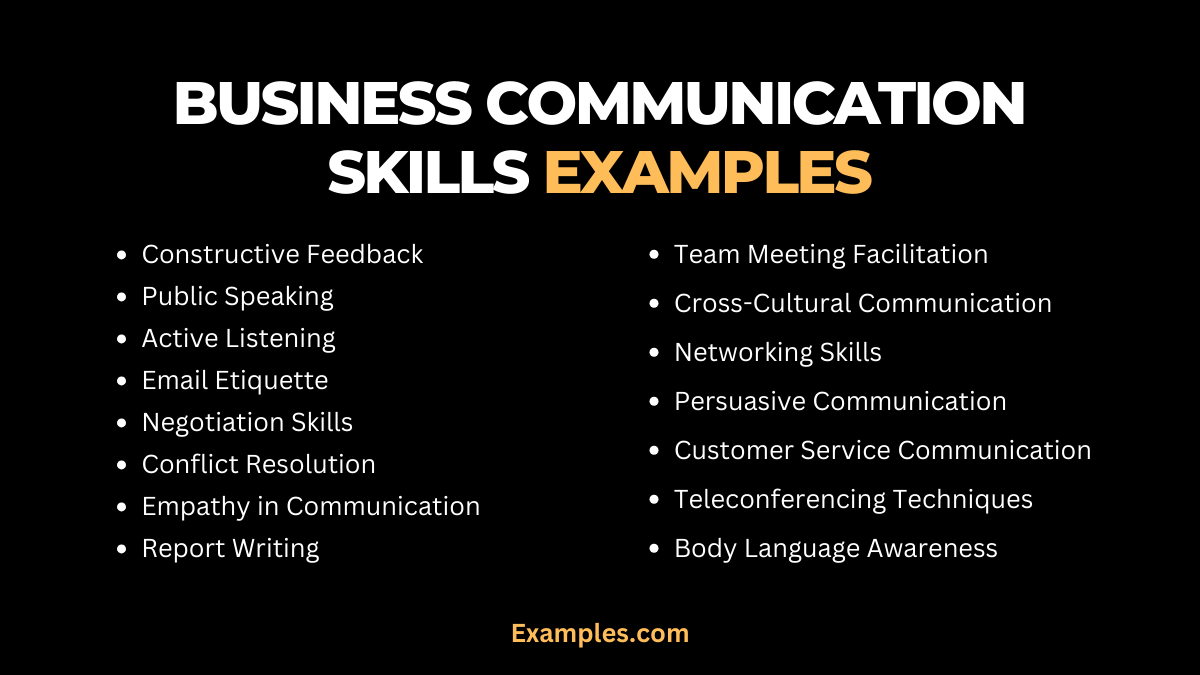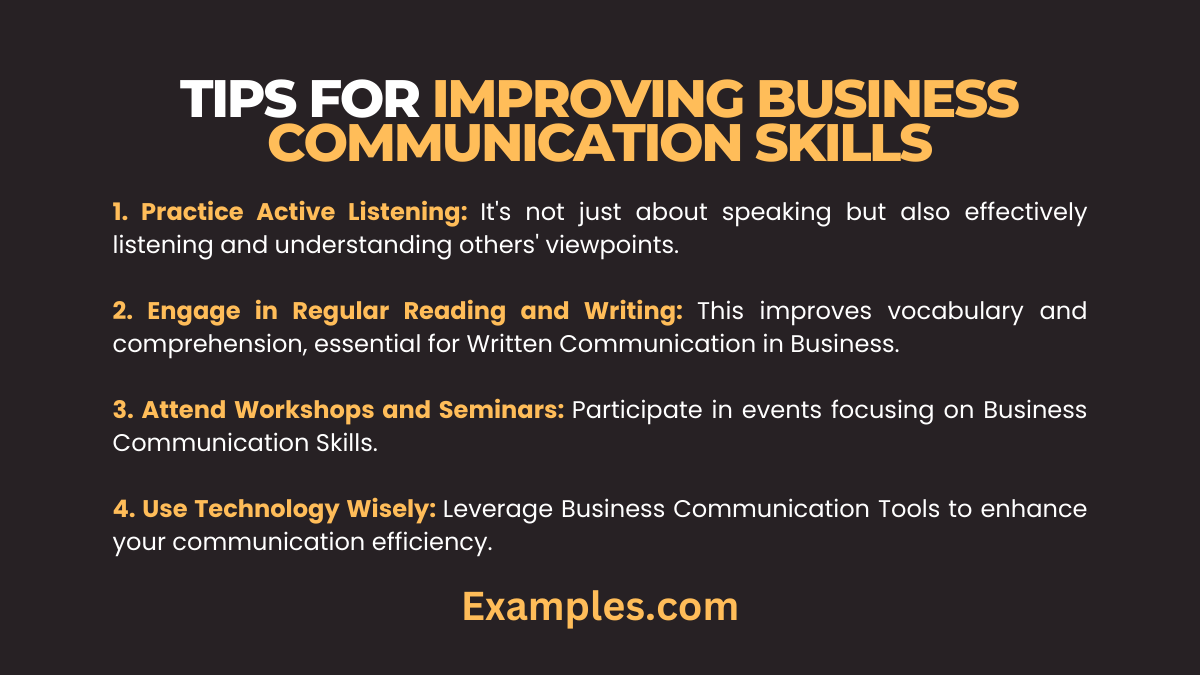Business Communication Skills
In the competitive world of business, having sharp Business Communication Skills is a game-changer. This complete guide, enriched with practical Communication Examples, offers an in-depth look into the art and science of effective corporate dialogue. Whether you’re a budding entrepreneur, a seasoned manager, or a student stepping into the world of business, mastering these skills is crucial. From verbal eloquence to non-verbal cues, we dissect various facets of business communication, providing you with real-world examples and techniques to hone your communication acumen.
What are Business Communication Skills?

Business Communication Skills are the abilities that enable individuals to convey information effectively in a business setting. These skills include both verbal and non-verbal methods of sending and receiving messages. In simple terms, they are the tools we use to communicate with colleagues, clients, and stakeholders in a professional environment. Good business communication skills involve clarity in speech, effective listening, understanding non-verbal cues, and being able to write clearly and concisely. These skills are essential because they help people share ideas, make decisions, and build relationships in the workplace.
What is the Best Example of Business Communication Skills?

The best example of Business Communication Skills can be seen in effective team meetings. In such settings, every aspect of business communication comes into play: clear articulation of ideas, active listening, constructive feedback, and non-verbal cues like body language and eye contact. A well-conducted meeting demonstrates how these skills facilitate collaboration, problem-solving, and decision-making. It involves an exchange of diverse viewpoints, where participants articulate their thoughts clearly, listen to others, ask relevant questions, and reach a consensus or a clear understanding. This example not only highlights the significance of these skills but also showcases their practical application in a crucial business scenario.
15 Business Communication Skills Examples

In the dynamic world of business, effective communication is key to success. This guide focuses on 15 Business Communication Skills Examples, showcasing how these skills are essential in various professional scenarios. From the precision of Written Communication in Business to the nuances of Verbal and Non-Verbal Communication, we cover a spectrum of skills that are vital for any professional. Whether it’s through Effective Business Communication techniques or utilizing modern Business Communication Tools, each example demonstrates the power of clear and effective interaction in the corporate world. Enhance your professional toolkit by understanding and applying these essential communication skills.
- Constructive Feedback: Offering and receiving feedback effectively to foster growth and improvement.
- Public Speaking: Delivering clear, engaging presentations in a corporate setting.
- Active Listening: Fully engaging with and understanding the speaker’s message.
- Email Etiquette: Writing clear, concise, and professional emails.
- Negotiation Skills: Effectively discussing and reaching mutually beneficial agreements.
- Conflict Resolution: Addressing and resolving disagreements constructively.
- Empathy in Communication: Understanding and acknowledging others’ perspectives.
- Report Writing: Presenting information in a structured, clear, and professional manner.
- Team Meeting Facilitation: Leading and managing productive team discussions.
- Cross-Cultural Communication: Navigating and respecting cultural differences in communication.
- Networking Skills: Building and maintaining professional relationships through effective conversation and follow-ups.
- Persuasive Communication: Convincing others with compelling arguments and presentations.
- Customer Service Communication: Handling customer inquiries and issues with tact and professionalism.
- Teleconferencing Techniques: Effectively communicating in virtual meetings, ensuring clarity and engagement.
- Body Language Awareness: Using and interpreting non-verbal cues to enhance verbal communication.
Business Communication Skills for Students
For students, mastering Business Communication Skills is a stepping stone to professional success. Here are eight key points:
- Foundation for Professional Growth: Understanding Business Communication Techniques prepares students for the corporate world.
- Enhances Academic Performance: Effective communication skills aid in clearer presentations and better collaboration in academic projects.
- Improves Job Prospects: Employers highly value candidates with strong Business Communication Skills.
- Facilitates Networking: Building professional networks early on is crucial, and communication skills are key in this process.
- Develops Leadership Qualities: Effective leaders require excellent communication skills, which can be honed during student life.
- Encourages Effective Teamwork: Understanding Forms of Business Communication helps in contributing effectively to group tasks.
- **Aids in Understanding Business Communication Examples”: Real-world examples become more comprehensible with these skills.
- Prepares for Diverse Work Environments: Skills like Intercultural Business Communication are crucial in today’s global business landscape.
Tips for Improving Business Communication Skills

Enhancing your Business Communication Skills involves continuous learning and practice. Here are eight tips:
- Practice Active Listening: It’s not just about speaking but also effectively listening and understanding others’ viewpoints.
- Engage in Regular Reading and Writing: This improves vocabulary and comprehension, essential for Written Communication in Business.
- Attend Workshops and Seminars: Participate in events focusing on Business Communication Skills.
- Seek Feedback and Act on It: Constructive criticism is vital for improvement.
- Use Technology Wisely: Leverage Business Communication Tools to enhance your communication efficiency.
- Role-Playing and Simulations: These methods help in practicing real-life business scenarios.
- Stay Updated with Trends: Knowing How the Internet Improved Business Communication keeps your skills relevant.
- Cultivate Emotional Intelligence: It plays a crucial role in Effective Business Communication.
Effective Business Communication Skills
Effective business communication is a blend of various skills. Here are eight crucial ones:
- Clarity and Conciseness: Be clear and to the point to avoid misunderstandings.
- Empathy and Understanding: Show consideration for others’ feelings and perspectives.
- Confidence in Verbal and Non-Verbal Communication: This builds trust and respect.
- Feedback Skills: Both giving and receiving feedback is crucial for Business Communication in the Workplace.
- Technological Proficiency: Understanding modern Business Communication Tools is vital.
- Problem-Solving Skills: Effective communication is key in resolving issues.
- Adaptability to Different Communication Styles: Recognizing and adapting to various Business Communication Styles is essential.
- Continuous Learning: Staying updated with Business Communication Books and resources.
Importance of Business Communication Skills
The significance of Business Communication Skills in the professional world is immense. Here are eight reasons why:
- Enhances Organizational Efficiency: Clear communication leads to better execution of tasks.
- Improves Team Collaboration and Morale: Good communication fosters a positive work environment.
- Facilitates Strong Customer Relationships: Essential for customer satisfaction and loyalty.
- Supports Career Advancement: Strong communicators often move up the career ladder faster.
- Critical for Leadership Roles: Leaders need excellent communication skills to inspire and guide teams.
- Aids in Conflict Resolution: Effective communication is key to resolving workplace conflicts.
- Enhances Global Business Opportunities: Skills like Intercultural Business Communication open doors in international markets.
- Drives Innovation and Change: New ideas and change require clear communication for acceptance and implementation.
Why are Communication Skills Important in Business?
Effective Business Communication Skills are crucial for clear information exchange, fostering teamwork, and enhancing decision-making, thereby driving business success and growth.
What Communication Skills are needed for Business?
Business requires skills like active listening, clear articulation, persuasive speaking, email etiquette, and the ability to interpret and use non-verbal cues effectively.
How Does Communication Skills Help a Business?
Strong communication skills lead to improved team collaboration, efficient problem-solving, enhanced customer relationships, and a positive workplace environment, pivotal for business prosperity.
In conclusion, the examples of Business Communication Skills presented illustrate their profound impact on professional success. From enhancing teamwork to fostering strong customer relationships, these skills are pivotal in navigating the corporate world. Embracing and refining these communication abilities is essential for anyone looking to excel in their career, contributing significantly to both personal and organizational growth.
For those looking to enhance their business communication skills, online courses can be incredibly beneficial. Platforms like edX offer a variety of courses tailored to improve various aspects of business communication. These courses are designed to help professionals refine their skills, whether it’s for networking, presentations, emails, or team meetings.
Understanding the theory behind effective communication is just as important as practicing it. Resources such as the article “Business Communication Skills: Loud and Clear” on the Alliance of Angels website provide valuable insights into the nuances of business communication. This resource dives into the practical aspects of communication, offering tips and strategies that can be applied in everyday professional scenarios.
Additionally, for managers and leaders, specific communication skills are necessary to lead teams effectively and ensure smooth operation within their departments. The Open Educational Resources (OER) from the State University of New York (SUNY) offers a comprehensive course on Business Communication Skills for Managers. This course is an excellent resource for those in managerial positions to develop targeted communication skills that cater to leadership roles.



